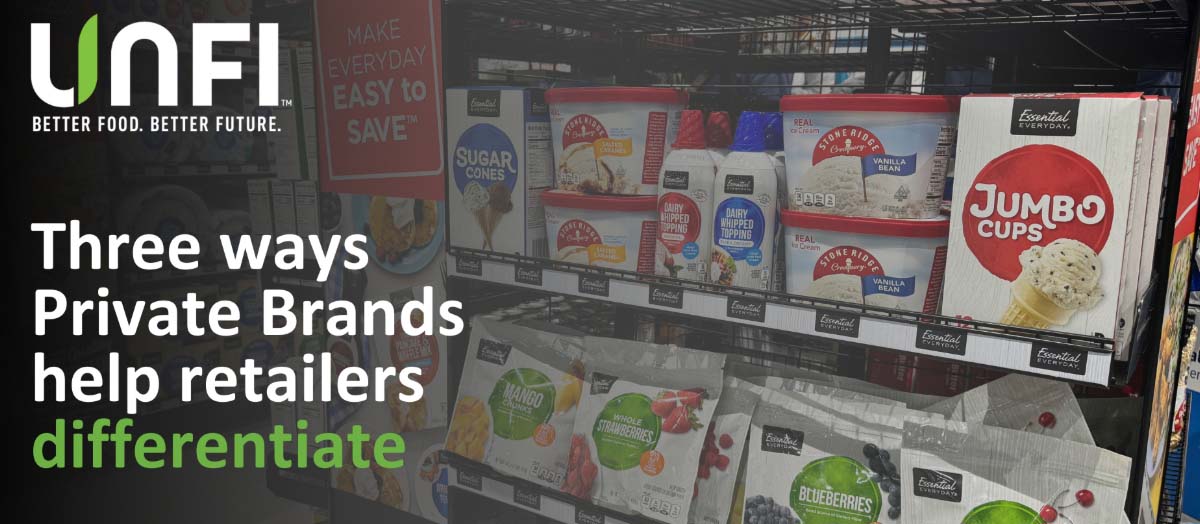Driving Differentiation Through Private Label Brands: 3 Best Practices for Retailers
February 10, 2025 5 minute read

Private brands are quickly emerging as a key focus area for value-conscious consumers and an important differentiator for retailers looking to drive store traffic and sales. In fact, private brands continued to outpace national brand sales in 2024, with total sales rising to $271 billion. It is clear today’s consumers are seeking out private brands, with 95% of Americans saying they purchase private label products in some form, and most saying they’re buying more or the same amount as they did last year.
For retailers, the importance of private brands is well established. Yet as the space has evolved and competition has grown, retailers are finding that they need to take a more strategic approach to their private brand offering to truly differentiate themselves. Leaders of UNFI’s Brands+ team recently presented best practices around private brand differentiation at the UNFI Spring & Summer Show East. Here are a few key takeaways.
1. Maximize Assortment and Private Brands Across Value Tiers
Gone are the days when private brands were simply the more affordable alternative to established national brand products. Today’s private brands are designed to meet consumer expectations around value, taking into account a range of considerations and shopper preferences beyond price alone, including quality, products attributes, new products, and even packaging
UNFI has numerous private brands, including opening price point, mid-tier national brand equivalents, natural and organic mid-tier, and premium natural and organic brands. For retailers, determining the right private brand offering comes down to understanding customer needs and which options and attributes will most improve the selection and shopper experience.
2. Elevate Quality by Offering Differentiated Premium Private Brands
Specifically, many retailers are expanding premium private brands to differentiate their offerings. Premium private brands can provide key attributes consumers are looking for at a lower price point than national brands, allowing retailers to focus on aspects of the product beyond cost alone. In today’s cost-conscious landscape, there’s often room for more than one private brand, and integrating a premium line into broader retail strategy can be effective.
UNFI has found success with premium brands, including its Woodstock and Wild Harvest brands. Wild Harvest, for example, has differentiated its offering by focusing on a natural, Non-GMO and organic portfolio. Wild Harvest offers products across the entire path to purchase, including grocery, frozen, dairy, pet, personal care, organic produce and most recently Grass Fed Grass Finished Beef. Of its more than 600 products, 70%+ are USDA organic, including gluten-free, non-GMO, and plant-based options. And, affordability remains a key differentiator, with products priced an average of10% to 15% less than national brand organic options.
3. Amplify In-store and Digital Marketing
With the right assortment and brand attributes, the next step for retailers is to ensure the presentation of private brands enhances the shopping experience for consumers. Here are a few ways to ensure consumers are seeing private brands at the right place and at the right time:
Place private brand offerings adjacent to national counterparts - For private brand offerings designed as an alternative to a specific national brand, putting both products near each other makes comparing and contrasting easier for consumers. Strategic messaging around “compare and save” can help make those differentiators even more obvious to consumers.
Create a display / end cap plan – Store displays are essential tools in capturing consumers’ attention and highlighting targeted products. These spotlights should not be exclusive to national brands. Private brands have a place in many display and end cap plans.
Use breakthrough marketing materials – The branding around private brands has come a long way. Retailers today have a number of ways to highlight these offerings through bold point-of-sale displays, marketing communications including social media and retail media network integration. Increasingly, these approaches must include a digital component to effectively command shoppers’ attention.
For more information on UNFI’s Brands+ program, click here.
